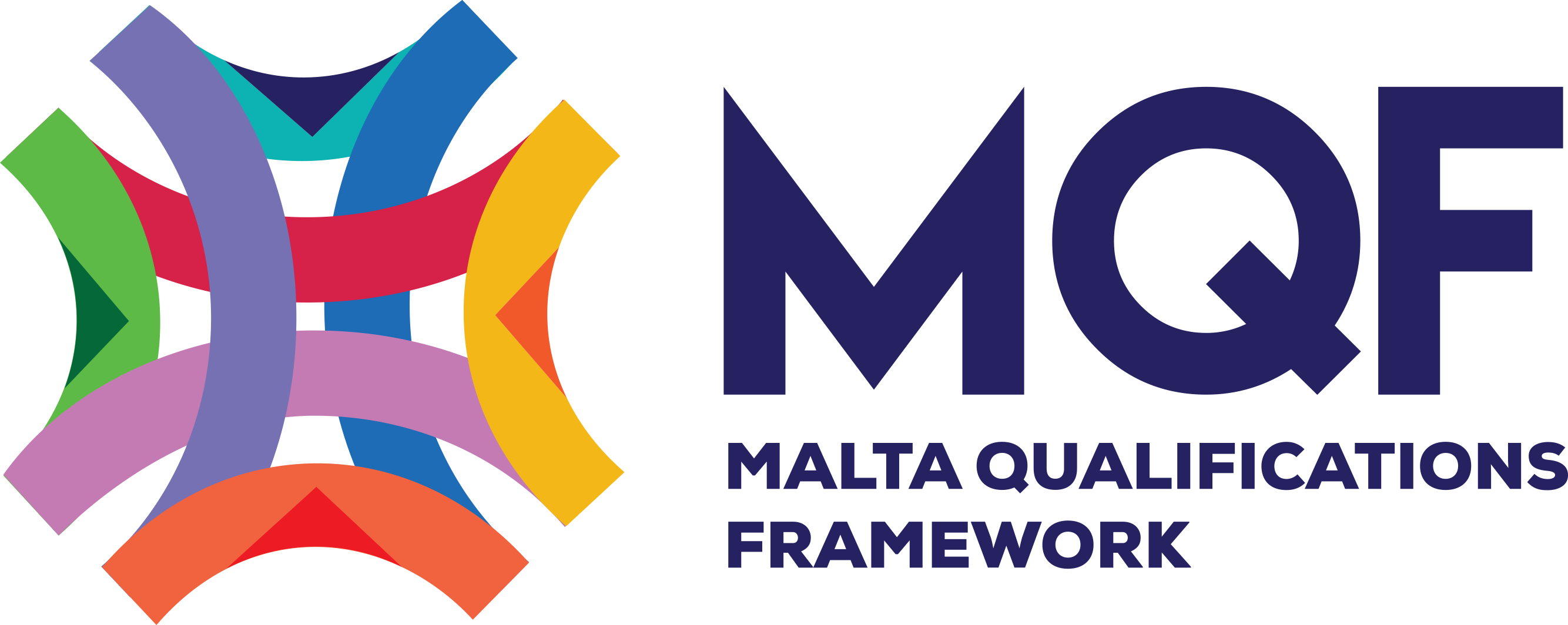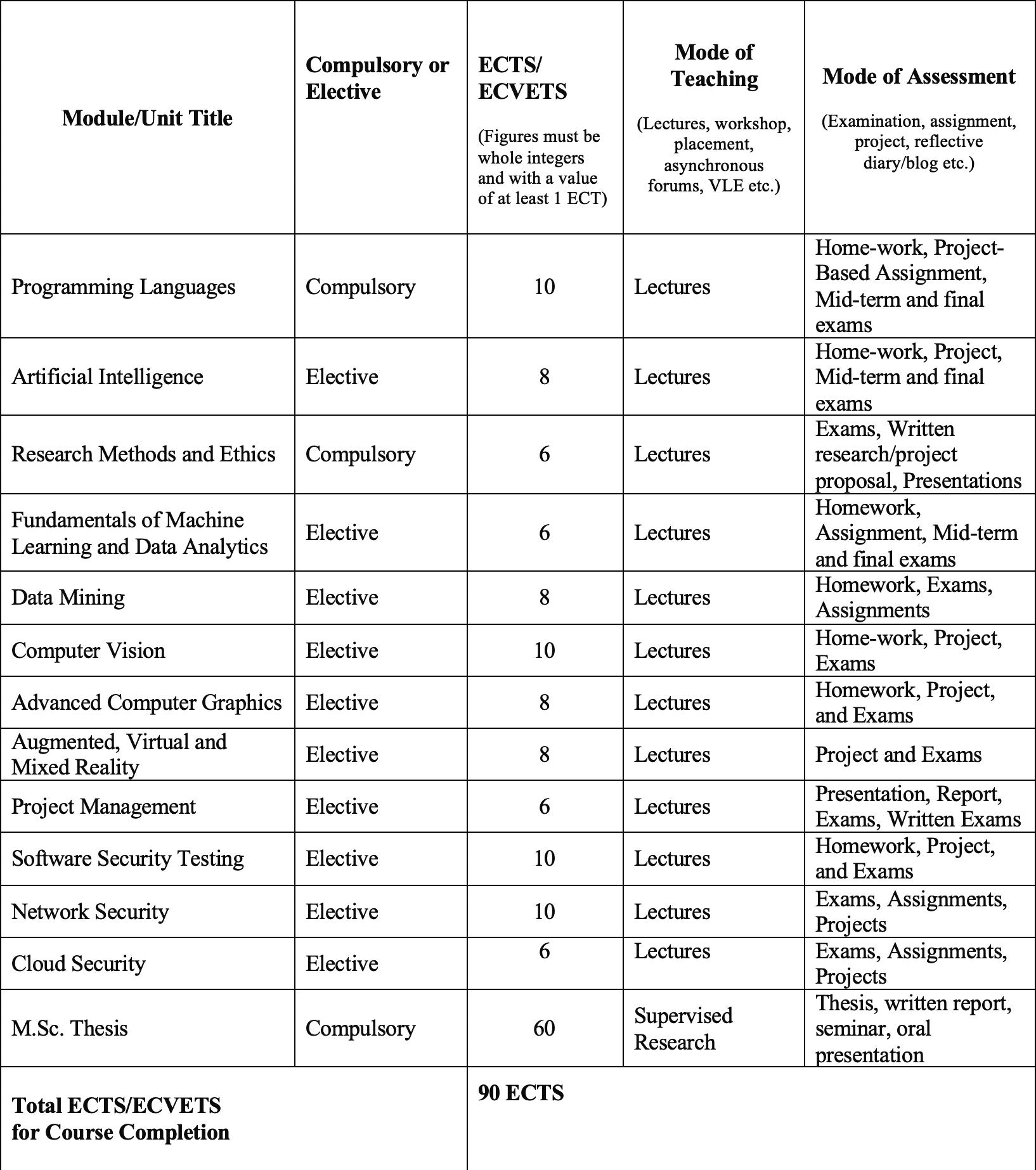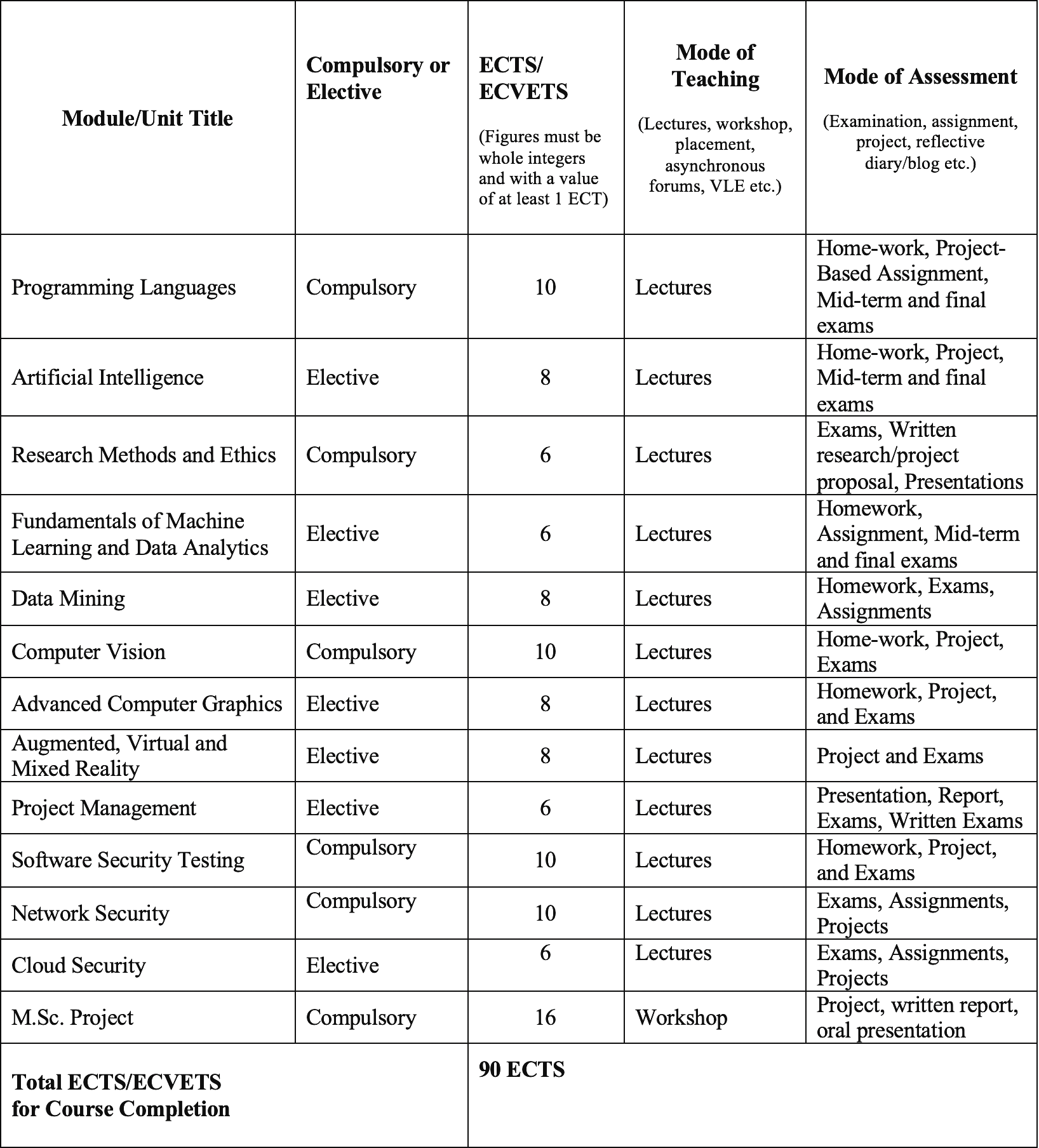MSc in Computer Science

This Program is accredited by the MFHEA
Degree Overview for Computer Science
The reason for offering MSc in Computer Science is to provide a foundation for a career in technology research and development. Jobs in the computer science industry can typically be found in a company’s information technology department, a government agency, or a non-profit entity. For individuals already working in the information technology sector, a master’s degree program may provide a career boost by enabling professionals to expand their expertise in the field. For example, a master’s degree program gives students specialized skills in one or more areas of computer science or technology, including software development, augmented and virtual reality, network security, or artificial intelligence. Students can also gain the research and analytical skills during the project- or research-based modules that they need to prepare for successful admission into a Ph.D. program for further study.
Entry Requirements for this Program
Applicants for the AUM undergraduate programs need to submit the following:
- Official AUM application: to be submitted online (website page).
- Scanned copies of Secondary School qualifications certificates and transcripts in the original language, as well as certified English translations, if necessary. If admitted to AUM, all original documents must be presented to the Admissions Office in order to be permitted to officially enroll. Details of acceptable Secondary School qualifications are provided below.
- Proof of English Proficiency
- The English language proficiency requirement may be waived if you are a native speaker of English and you have completed your secondary education in a country where English is the official language and English was the language of instruction where you graduated.
- AUM reserves the right to request English test results from any applicant.
English Language Examining Boards recognised by AUM and minimum scores required:
| Undergraduate | IELTS | TOEFL | ESB Certificate |
| 6.0 | 65 | B2 |
Note: all score reports will only be valid if issued within 2 years from the date of matriculation at AUM.
For candidates following the Maltese education system:
- A Matriculation (MATSEC) certificate, with two subjects at an Advanced level, three other subjects at Intermediate level and Systems of Knowledge, and a pass at Grade 5 or better in the Secondary Education Certificate (SEC) examinations in English Language. If you are not in possession of a SEC certificate in English, you might be asked to carry out an Institutional English diagnostic test. OR
PROGRAM DETAILS
Program length:
24 Months./Full-Time
36 Months./Part-Time
GPA needed to earn the degree:
3.0 or higher
Credits needed to earn the degree:
45US credits / 90ECTS
Degree level:
MQF Level 7
Pass Rate:
80%
OVERALL COURSE OBJECTIVES
Students may join MSc in Computer Science (research-based) program, in which 30 ECTS credits are devoted to courses and 60 ECTS credits to an individual research-based thesis. Otherwise, the course-based route (M.Sc. in Computer Science (taught), 80 ECTS credits are devoted to the courses, and 10 ECTS credits to an MSc project can be an individual/group work. The study program relates closely to the research carried out at AUM through research-based courses and advanced research projects.
The program’s overall goal is to prepare students for prominent careers in industry or further academic study based on their acquired knowledge, skills, and competencies.
MSc in Computer Science degree holders possess knowledge of:
a) Knowledge in different modern computer science fields, including artificial intelligence, data mining, network security, advanced computer graphics, computer vision, augmented, virtual, and mixed reality.
b) Research methodology, including the fundamentals of scientific writing, how to give a scientific talk, how to evaluate a scientific paper, and research ethics.
c) Apply the most suitable technique(s) for solving specific computer science problems, and justify their choice through argumentation or the implementation of the (partial) solution using software development tools/programs.
d) Advanced principles and techniques from the elective areas in which the student decided to develop particular expertise. Such expertise is developed by following elective courses in the research areas of staff members, utilizing advanced independent studies, and mainly during the MSc thesis work.
e) Established and potential applications of techniques developed within the chosen area of specialization.
MSc in Computer Science degree holders can apply the methods and procedures as follows:
a) Assess methods and tools to design, implement, test, document, and maintain a computer-based system.
b) Design and develop research methods, techniques, and problem-solving approaches from the field of research in which they are specializing.
c) Analyze complex real-world problems and devise efficient computer-based solutions.
d) Communicate effectively and professionally both in writing and using presentations to the specialists.
e) Originate the works by following ethics and their impact on computer science.
MSc in Computer Science degree holders can apply their knowledge and skills as follows:
a) Work collaboratively with others on a team, contributing to the management, planning, and implementation of a computer system;
b) Independently propose a small scale research project, plan its execution, undertake its development, evaluate its outcome, and report on its results in a professional manner;
c) Advance knowledge through the project- and research-based innovation in the relevant field.
d) Interpret and present theoretical, practical issues and empirical findings.
Learning Outcomes for Computer Science skills for the whole course,
A graduate with MSc in Computer Science taught- or research-based both will have the ability to:
a) Interpret computer science concepts, designs, and solutions effectively and professionally;
b) apply knowledge of computing to produce effective designs and solutions for specific problems;
c) evaluate, criticize, and synthesize scholarly literature relating to the field of computer science; and
d) Responsible for creating software development tools and systems in modern computing platforms.
e) assess and critique the state of the art developments within their chosen field of interest. Besides, a graduate with MSc in Computer Science (research-based) can undertake outcomes-based research for solving a particular computer-based solution with minimal supervision.
General Pedagogical Guidelines and Procedures for this Course
The teaching method follows the standard classroom model in which the primary mode of instruction is lectures, lab exercise (practical for programming), and engagement with students through discussion. The instructor provides material, including where appropriate videos, for the students to study outside of class. In class and lectures to clarify the material, the instructor leads in-class exercises (problems, design projects, instructing on software, programming languages, discussions, etc.).
Besides, computer lab-based sessions will enable students to comprehend the fundamentals discussed in the class and acquire hands-on in using and applying learned concepts through computer programming problem solving and relevant works. Out of class reading and homework assignments are regularly assigned, submitted, and graded. Students also can engage in one-to-one instruction through office hours given by the course (module) instructor.
GENERAL ASSESSMENT POLICY AND PROCEDURES
Assessments
Computer Science disciplines require strong mathematical and analytical skills. Assessments (in-class examinations, homework and individual and team projects) will focus on those skills. In general, grades will be assigned based on performance on those assessments. Students with learning disabilities will be addressed. Additional time or quiet settings will be provided for examinations for those students as determined appropriate.
Cheating and Plagiarism
Exams will be administered in classroom settings by the instructor.
Appropriate identification will be required. Class notes or limited sets of materials may be available to students during exams. Only simple calculators without memory cards will be permitted to avoid students bringing additional materials to assessments. The plagiarism tool, Turn-it-in, will be applied to document reports and papers are not copied from other sources without proper citation. If the similarity report exceeds more than 15%, instructor will take further investigation on the reports/documents and act as AUM policy.
RELATIONSHIP TO OCCUPATION/S
The MSc in computer science degree program is intended to produce graduates who can develop and implement practical solutions for software development, computer vision, Artificial Intelligence (AI), computing systems, data science, and related applications. This program responds to student and employer demand for a skilled workforce in computer science that knows the advancement of computer programming, software development tools, and how to utilize these emerging technologies and tools. This degree program does not lead to a warranted profession or regulated occupation.
RESEARCHED BASED COURSE STRUCTURE SAMPLE

Please Note:
- The student of the Master of Science in Computer Science (research-based) must take module M.Sc. Thesis.
- All courses will offer every year (two semesters), including compulsory modules. Students can select/register based on their choice from the offered modules each semester.
- A full-time student cannot register for more than 30 ECTS/semester, while a part-time student can register a maximum of 18 ECTS/semester.
TAUGHT BASED COURSE STRUCTURE SAMPLE

Please Note:
- The student of the Master of Science in Computer Science (taught) must take module M.Sc. Project.
- All courses will offer every year (two semesters), including compulsory modules. Students can select/register based on their choice from the offered modules each semester.
- A full-time student cannot register for more than 30 ECTS/semester, while a part-time student can register a maximum of 18 ECTS/semester.